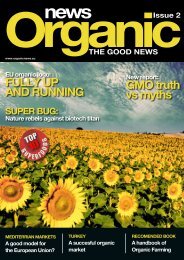Organic News 3
Organic News magazine issue 3
Organic News magazine issue 3
You also want an ePaper? Increase the reach of your titles
YUMPU automatically turns print PDFs into web optimized ePapers that Google loves.
STANFORD ANTI-ORGANIC STUDY<br />
RODIN’S THE GATES OF HELL, STANFORD UNIVERSITY<br />
<strong>Organic</strong> food is NOT better than any other food ?<br />
“Some believe that organic food is always healthier and more nutritious,<br />
but we were a little surprised that we didn’t find that.”<br />
You’re in the supermarket eyeing a basket of sweet, juicy<br />
plums. You reach for the conventionally grown stone<br />
fruit, then decide to spring the extra $1/pound for its organic cousin.<br />
You figure you’ve just made the healthier decision by choosing the<br />
organic product — but new findings from Stanford University cast<br />
some doubt on your thinking.<br />
here isn’t much difference between organic and conventional<br />
foods, if you’re an adult and making a decision<br />
“T<br />
based solely on your health,” said Dena Bravata, MD, MS, the senior<br />
author of a paper comparing the nutrition of organic and nonorganic<br />
foods, published in the Sept. 4 issue of Annals of Internal<br />
Medicine.<br />
team led by Bravata, a senior affiliate with Stanford’s<br />
Center for Health Policy, and Crystal Smith-Spangler,<br />
A<br />
MD, MS, an instructor in the school’s Division of General Medical<br />
Disciplines and a physician-investigator at VA Palo Alto Health Care<br />
System, did the most comprehensive meta-analysis to date of existing<br />
studies comparing organic and conventional foods. They did not<br />
find strong evidence that organic foods are more nutritious or carry<br />
fewer health risks than conventional alternatives, though consumption<br />
of organic foods can reduce the risk of pesticide exposure.<br />
The popularity of organic products, which are generally<br />
grown without synthetic pesticides or fertilizers or routine<br />
use of antibiotics or growth hormones, is skyrocketing in the<br />
United States. Between 1997 and 2011, U.S. sales of organic foods<br />
increased from $3.6 billion to $24.4 billion, and many consumers<br />
are willing to pay a premium for these products. <strong>Organic</strong> foods are<br />
often twice as expensive as their conventionally grown counterparts.<br />
28<br />
WWW.ORGANICNEWS.EU






